Unless You’re In The Military, The President Is Not Your Commander In Chief
Many people seem to have a rather inappropriate view of their relationship to the President of the United States.
Rick Santorum made a comment on the campaign trail in Iowa today that caught my eye:
Santorum hacked away at Romney on Monday, discounting the former business executive’s emphasis on his private-sector experience. “We are not looking for executive experience. We are looking for a commander in chief,” Santorum told a campaign event.
In addition to bringing up the question of how one could be a commander in chief without having executive experience, it reminded me of something that Eric Cantor said in his 60 Minutes interview yesterday:
Stahl: As an American, are you proud of the president?
Cantor: You know, he is my commander in chief. I respect the man. I like the president. You know, the disagreements that we have are policy-based. You know, he’s got a lot on his plate. I respect that. And I want to continue to try and work with him.
This isn’t anything new. Especially since the September 11th attacks, and probably before then although I can’t say I noticed it quite as much, there has been a tendency to refer to the President as “our” Commander in Chief, or for civilians to say that the President is their Commander in Chief. In reality, of course, the Constitution merely states that the President “shall be Commander in Chief of the Army and Navy of the United States, and of the Militia of the several States, when called into the actual Service of the United States.” In a comment this morning, Steven Taylor called this tendency among civilians to use this kind of terminology in reference to the President creepy, I’d agree but I’d go a step further.
This idea of the President as “Commander in Chief of America” is at the center of what has been called the Imperial Presidency. As Gene Healy noted in his excellent book The Cult of the Presidency, the Presidency we know today bears almost no resemblance to the institution the Founding Fathers created when they drafted Article II of the Constitution. For roughly the first 100 years of the Republic, Presidents kept to the limited role that the Constitution gave them. There were exceptions, of course. Most notably revolving around military crises, wars, or similar circumstances. Abraham Lincoln greatly expanded the powers of his office during the Civil War but so did Presidents such as James Polk and Andrew Jackson. Even that great beacon of limited government Thomas Jefferson used the opportunity of the Louisiana Purchase to exceed the powers of his office. For the most part, though, America’s 19th Century Presidents held to the limited role that is set forth in Article II, which is probably why they aren’t remembered very well by history.
At some point, though, roughly starting in the early 20th Century with the Presidency of Theodore Roosevelt, the idea of the President as something beyond what the Constitution said he was took hold. Presidents from Theodore Roosevelt to Woodrow Wilson to FDR went far beyond anything resembling Constitutional boundaries to achieve their goals, and they were aided and abetted in that effort by a compliant Supreme Court and a Congress that lacked the courage to stand up for it’s own Constitutional prerogatives. Then, when World War Two ended and the Cold War began, the powers of the Presidency began to grow exponentially.
Throughout this period, the one common theme regardless of who sat in the Oval Office was the manner in which the Presidency itself became more and more entangled with a military air. Where previous Presidents were open and available to the public, the President today goes from the White House to Marine One to Air Force One, all the while encased in the tightest security bubble of any person in the world. He drives around town in a limousine that resembles a tank more than an actual automobile. And he’s been given almost unquestioned authority of the deployment of American military forces. Then there’s the question of whether it’s really appropriate for a President to return the salute of a military officer. Since he is a civilian, there’s a fairly good argument that it not only isn’t necessary for the President to return a salute, but that it’s inappropriate. In fact, before President Reagan, I don’t have a recollection of any other President having done so on a regular basis, although it may have occurred. In any case, along with the Imperial Presidency, is seems that we’ve also developed a Militaristic Presidency. The fact that such a view of a President’s proper role makes it easier for them to commit American forces to dubious missions raises the question of whether we’ve gone way too far in cloaking the Presidency with an air of authority hat is wholly inappropriate.
There’s another danger in the idea that the President is “our Commander in Chief.” If the man, or woman, in the White House is just “the President,” then disagreeing with and criticizing them isn’t much different than disagreeing with any other politician. Accept the idea that they are your “Commander in Chief,” though, and all of a sudden the subtle idea that they are their to give all of us orders that must be obeyed gets introduced into the mix. Now, we’re obviously still living in an era where dissent, and even ridicule, are not only accepted but expected parts of political discourse. However, do we really want to start introducing into our political culture the idea that the relationship between citizen and President is in anyway similar than, say, the relationship between a Pfc. and their commanding officer?
So, let’s stop this nonsense that the President is our Commander in Chief, because unless you happen to be uniform at the moment he isn’t.
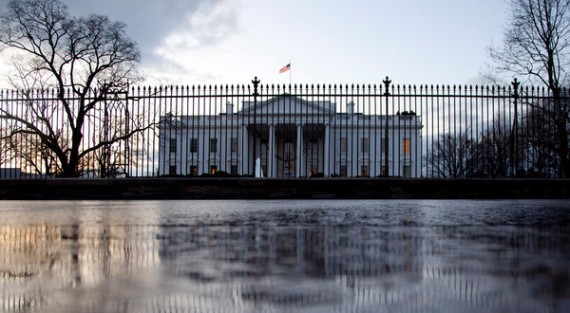

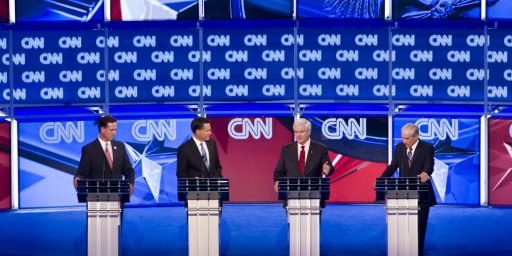
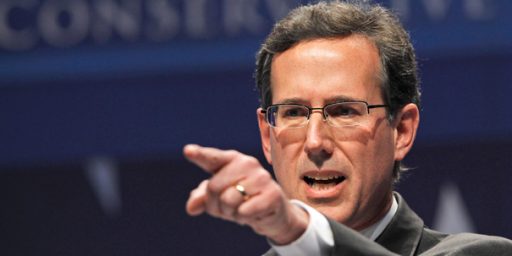
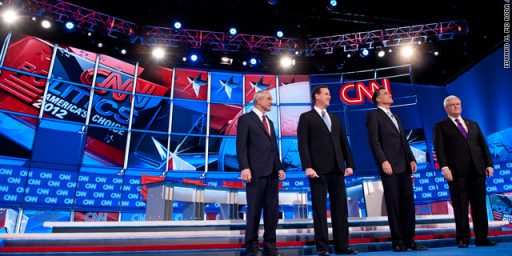
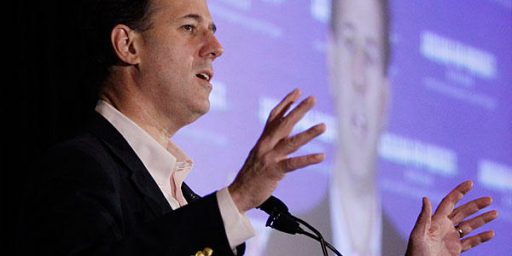
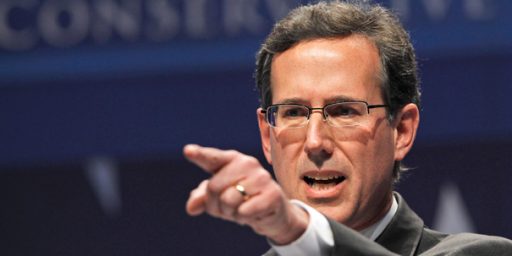
Some people aren’t happy unless they are groveling before a powerful daddy figure, real or imagined.
I agree.
First, if I recall correctly, you salute the uniform, not the man. The POTUS is not in uniform.
Second, he is an employee. He may be a very important employee, but he works for us, we do not work for him. He can’t command me to do a damn thing.
This is absolutely ridiculous and it began with the forelock-tugging urge so common in conservatives. The first time I became really uncomfortable with this crap was under Nixon when he decided he needed a comic opera praetorian guard at the White House.
And then of course Reagan who not only saluted all and sundry but simultaneously made himself pope with constant invocations of God.
Presidents are not uniformed officers, nor are they clergymen. They are people we hire to run the executive branch of government. Period.
The troops have already decided who they want.
Ron Paul’s top 3 donors …
Us Air Force 23,437.00
U.S. Army 23,053.00
U.S. Navy 16,973.00
Mitt Romney’s top 3 donors…
Goldman Sachs 354,700.00
Credit Suisse Group 195,250.00
Morgan Stanley 185,800.00
I agree with everything you write. You make good points but please, please, please learn to spell or get a proof reader so it is not so painful to read.
@Hwt123: How much have members of the armed forces donated to Romney?
Excellent post, Doug.
As for Santorum’s quote that people want a CiC, he probably shouldn’t be promoting that as the criteria. The only foreign policy position I’ve heard from him lately is that he wants to bomb Iran, which is enough information for most of us to doom his chances.
@Franklin:
As I said, the part of Santorum’s line that confuses me is the idea that there is such a thing as a good candidate for Commander in Chief without Executive experience.
If Obama is Eric Cantor’s commander in chief, then Obama can just order Cantor to pass his budget and Cantor will obey. Right? Why all the gridlock in Washington?
Doug, I can understand some one having a peeve about this, but really mountains and molehills. As you yourself said,
(my emphasis)
@OzarkHillbilly:
There used to be a time when nobody could conceive that an American President would have the authority to order an American citizen killed without due process of law.
This isn’t the biggest issue in the world, but the growth of the Imperial Presidency is one of the greatest threats to liberty out there IMO
@Will: The only error I saw was a possessive-its-has-no-apostrophe in “it’s own Constitutional prerogatives”. Did you see more than that, or was that one enough for you? 🙂
@Will: As he has a career and therefore limited time to post, I see no reason to hold typing accuracy against Doug. Let’s not be silly.
It’s not just the growth of the Imperial Presidency, Doug, it’s the growth of the Imperial Government at large. What I predicted in 2003 has come true faster than I expected.
Indeed Doug, and I am still a little bit flabbergasted by that fact. And when one measures that reality up against a few people not in the military wanting to call the President their CiC…. Well, at least I can tell the difference between mountains and molehills.
This is one of my pet peeves, we do not elect a commander in chief, we elect a President. His title is “President of the United States of America”, commander in chief is just ONE of his duties. There are a lot of psychological implications in how we refer to our leaders.
@michael reynolds:
At least for the USMC both are true: for example Cars bearing officer stickers senior to you are saluted irrespective of the person in the car (non uniformed or even non-military spouses) and if you recognize an officer senior to you, you salute even if he is not in uniform. Of note, the non-uniformed recipient of a salute acknowledges the salute, but does not return the salute. Also, members of congress and other high ranking civilian officials are also entitled to salutes even though they are not commanders-of-anything, and they do not typically return salutes either
@MM: Good question. Figures don’t lie, but…
Bravo, Doug. I gave you a MUST-READ tweet for this one.
http://twitter.com/#!/kathykattenburg/status/153995717139111936
@Doug Mataconis:
Are you saying that executive experience is essential to be a good candidate for Commander in Chief? As much as I hate to agree with Santorum, I don’t think Romney’s business experience gives him an edge in the role of Commander in Chief. If it did then one could say Donald Trump’s business executive experience would give him an edge over Santorum. Even though I can’t stand Santorum, I’d prefer him with that power over Trump.
@ponce:
Humans are primates, and like all primates our instinct is to organize ourselves into dominance hierarchies. Now we can, with concerted effort, notice when we’re succumbing to that instinct and resist the impulse, but most people aren’t interested in that sort of effort and are perfectly happy to go through life on instinctual autopilot.
I think it’s acceptable for someone not in the military to refer to the president as “my commander-in-chief,” in the same sense that I may refer to “my senator,” “my congressman,” “my school board representative,” or “my barber.” The difference, of course, is that s/he works for me, not the other way around.
Pwned. By 9 years. <g>
@OzarkHillbilly: The right wingers worshipped the guy who has been forgotten. What cracked me up was the constantly calling whats his name their “Commander AND Chief”. Typical chickenhawk talk